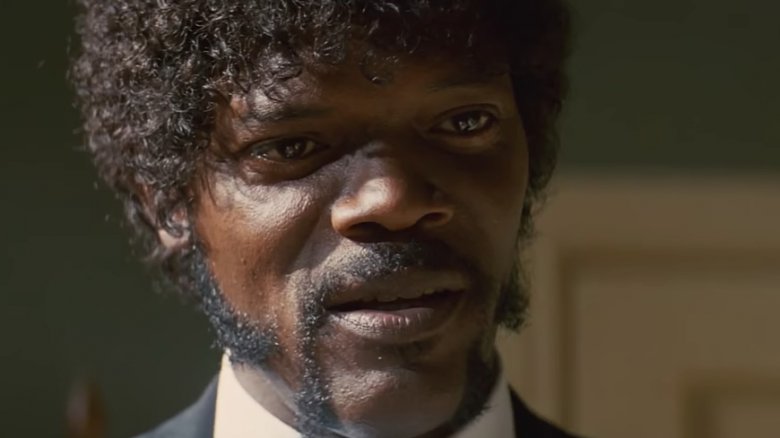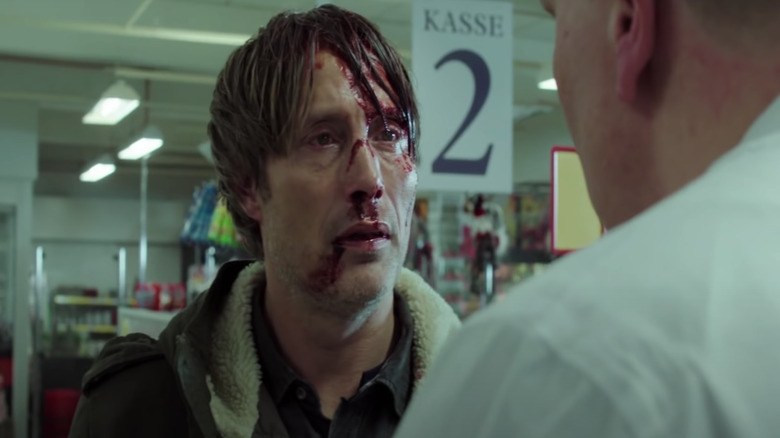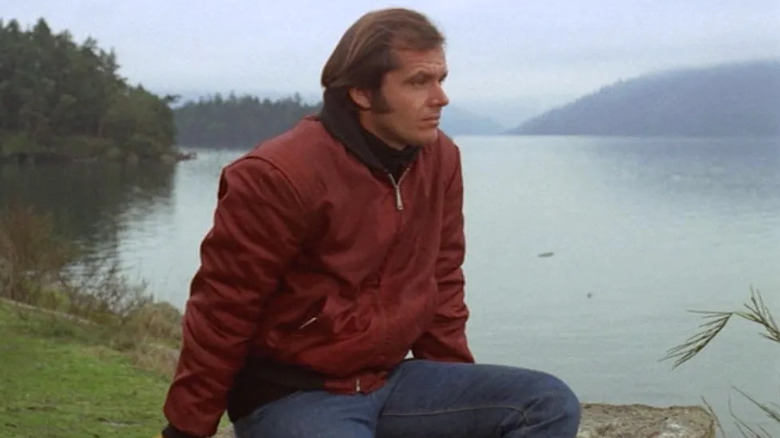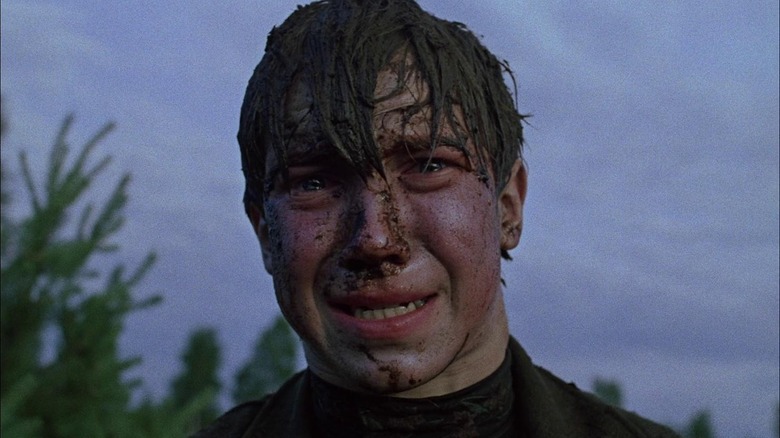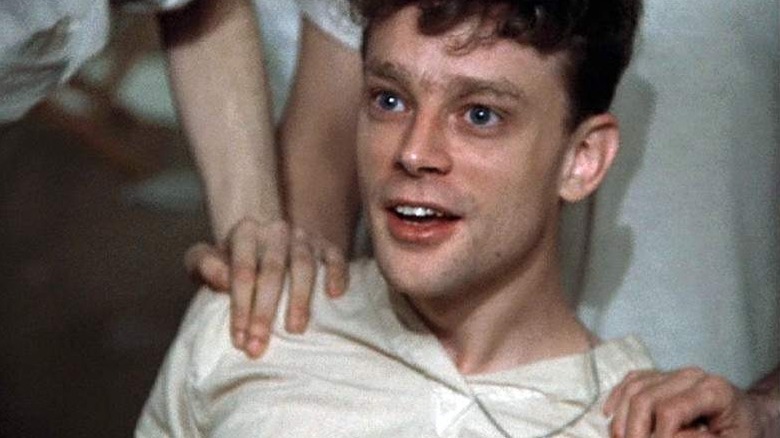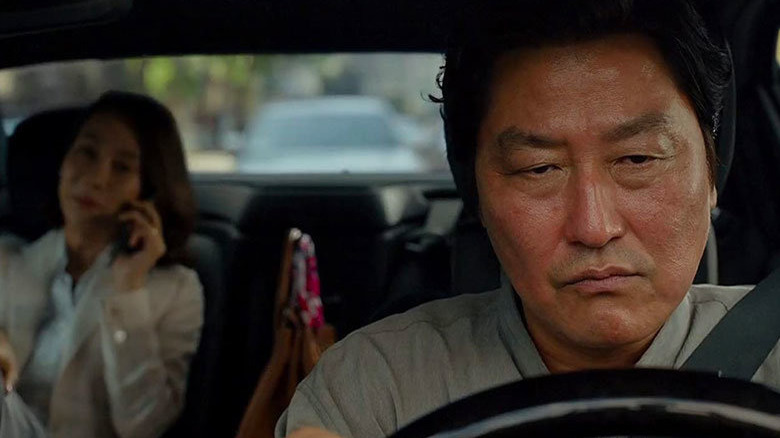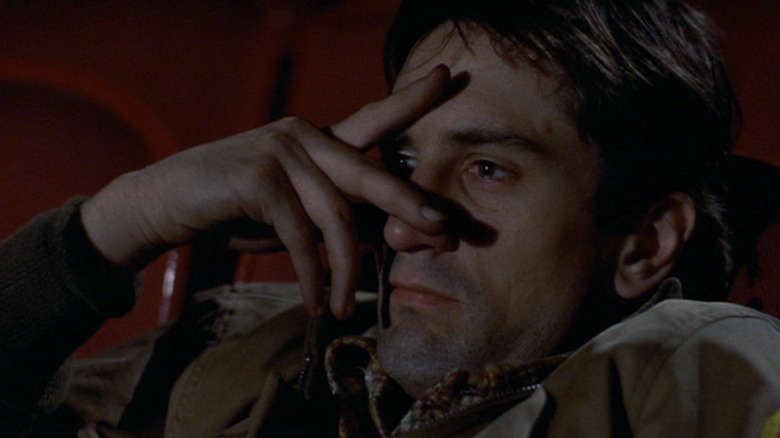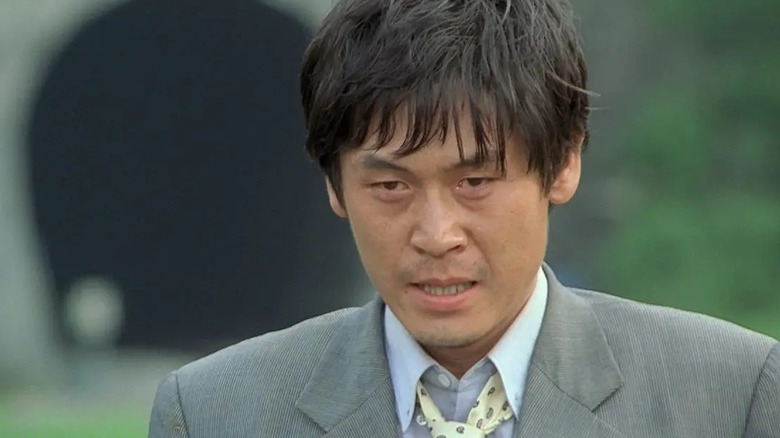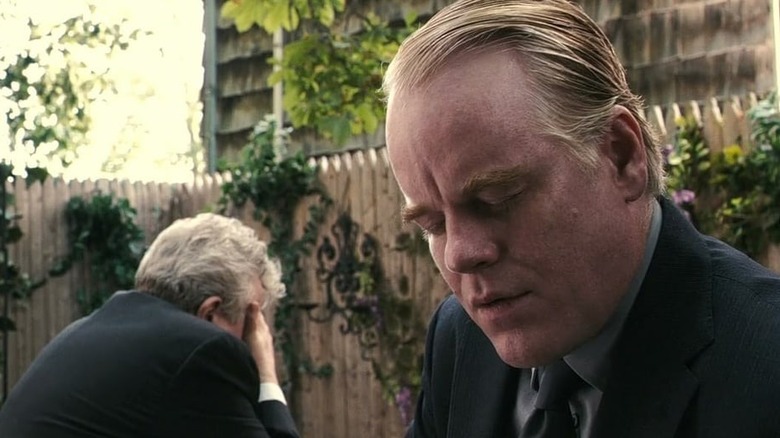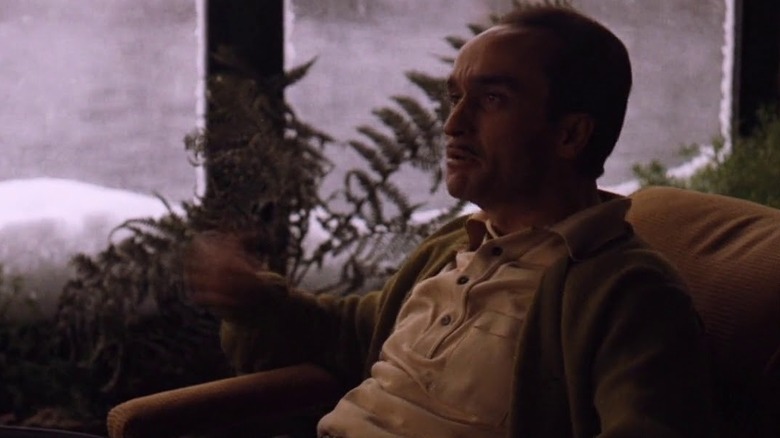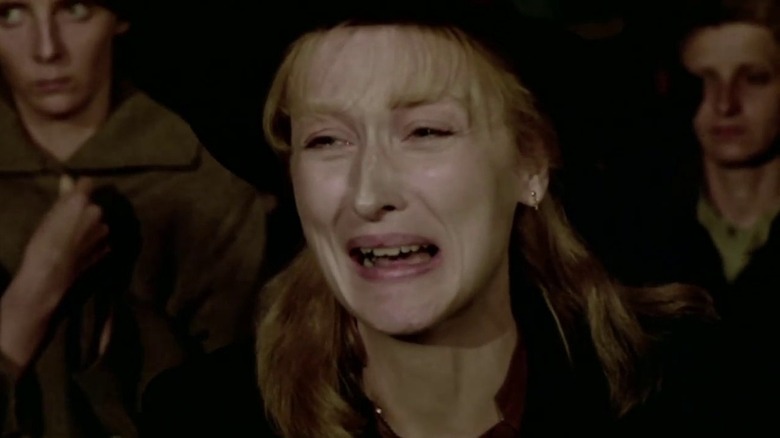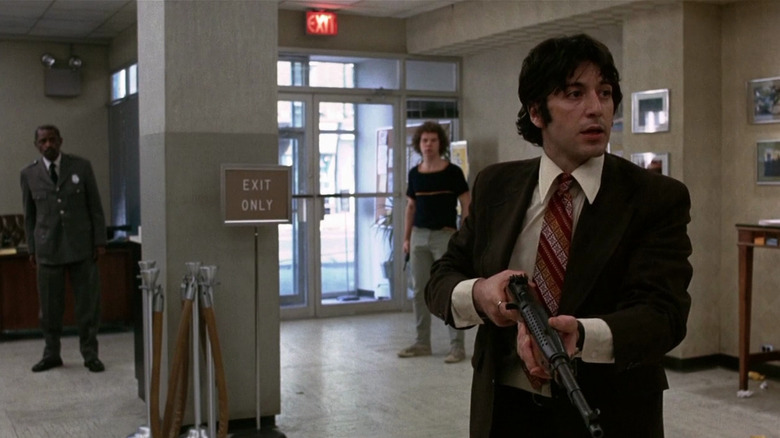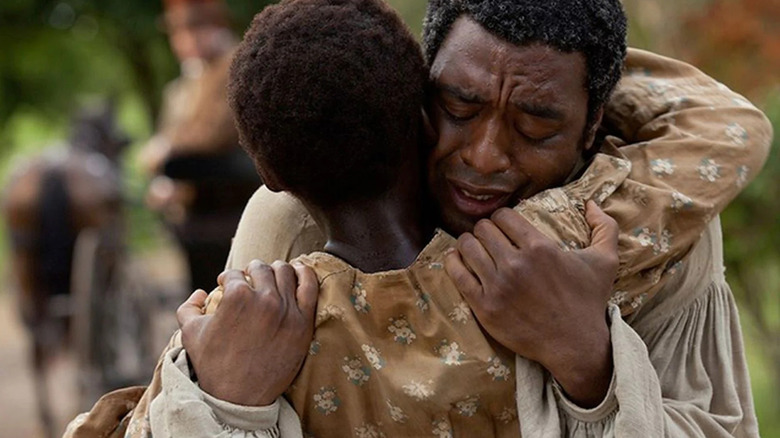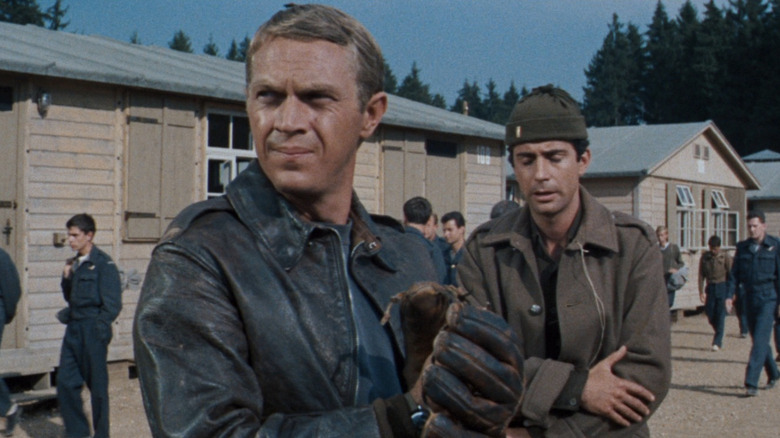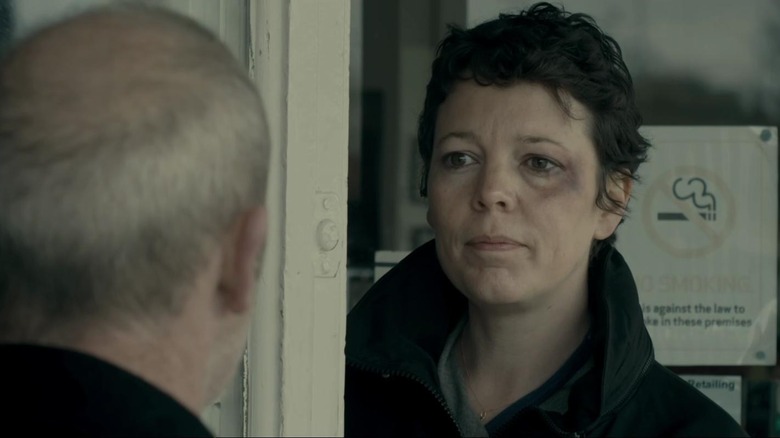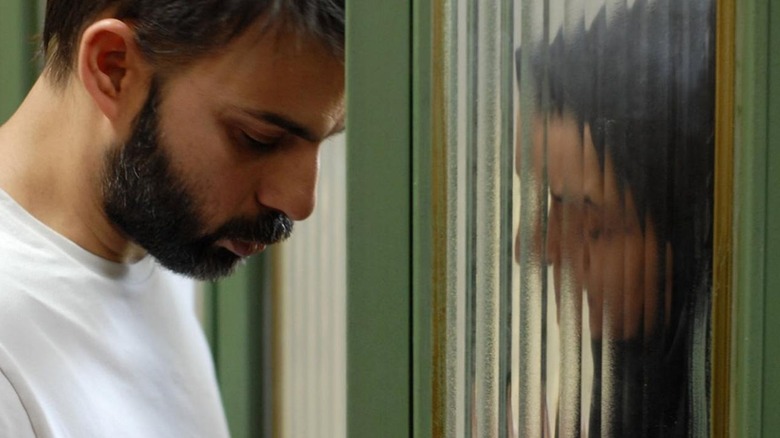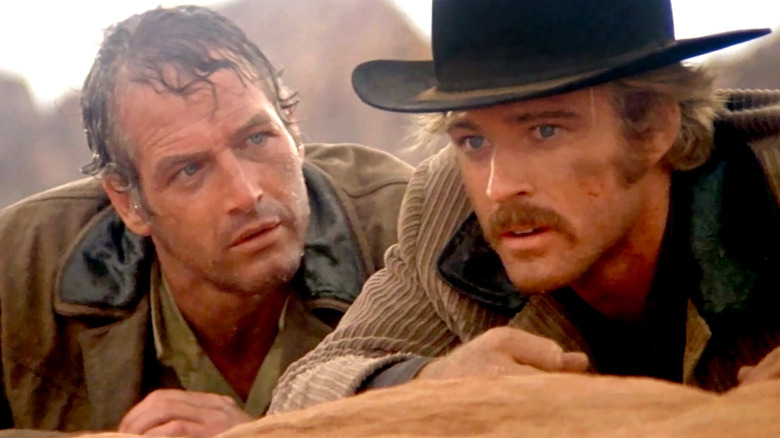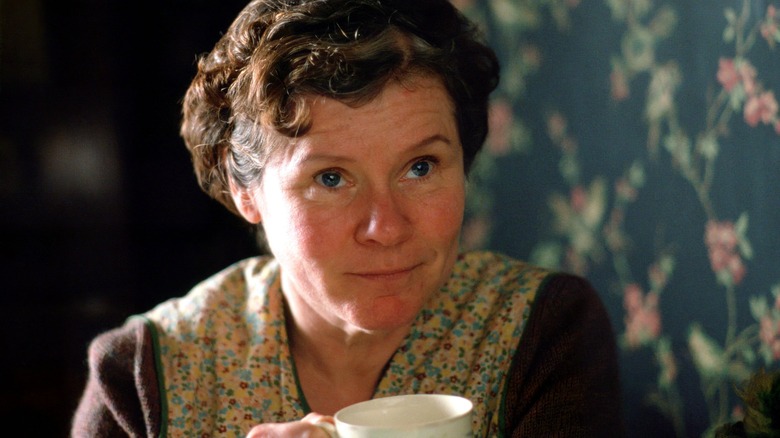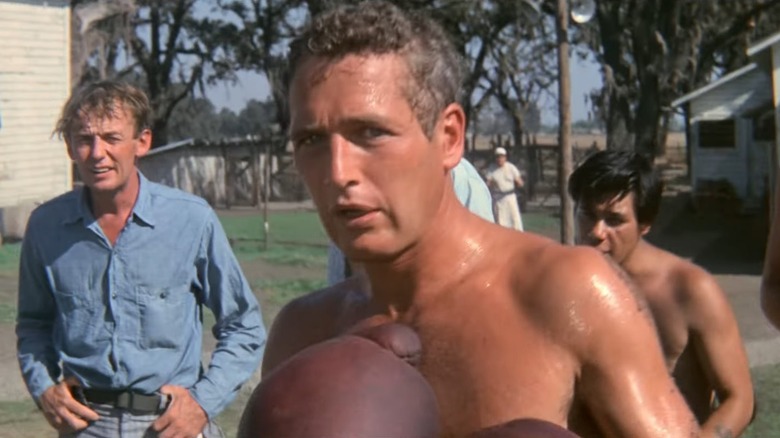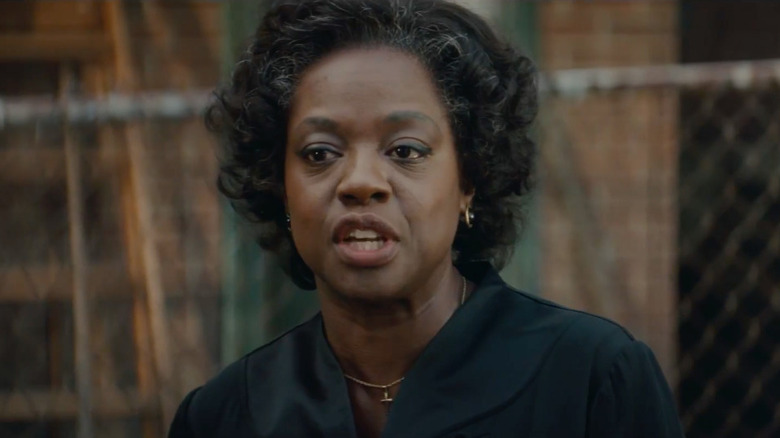Movie Performances That Are Practically Flawless
Good performances are, perhaps more than anything, what make movies worth watching. We certainly don't mean to undersell the importance of directors, writers, or composers, and there are definitely people working in each of those fields that make their work the star of the movies they make. That being said, when you watch a movie, you're watching performances first and foremost. They're the devices used to tell these stories to us, and as such there's something incredibly special about an actor who goes above and beyond the call of duty.
Some roles can't be played without a great actor at the wheel. Others wouldn't be nearly as special without a particular actor in the role. Picking out a selection of performances that aren't just good but perfect isn't necessarily easy, but it's one of our favorite topics when it comes to talking about movies. Here are some of our favorite performances that aren't just good but downright perfect.
Charlize Theron brought fury to life
She may not be the titular character, but make no mistake: the star of Mad Max: Fury Road is Charlize Theron's Imperator Furiosa. She is the heart and soul of George Miller's gorgeous post-apocalyptic road war movie. Credit where it's due: Miller gave Theron stellar material to work with. That being said, the character would fall flat in the hands of an actor less capable than Theron.
Furiosa is, in Theron's hands, every bit her name, a woman of determined fury hellbent on freeing Immortan Joe's brides from lives of torment. She's the kind of character that an actor wouldn't usually give as much care as a traditionally prestigious role. Theron clearly wasn't content with that though, and instead she creates a true modern icon out of Furiosa, embellishing her determined fury with a quiet empathy that shines through in some of the film's calmer moments. As Furiosa finally achieves her ends and kills Immortan Joe, she grunts what's come to be the defining line of the film: "Remember me." We have, and will continue to do so for years to come.
Ryan Gosling balanced torment and levity
Ryan Gosling seems to have dedicated much of his career onscreen to defying expectations. After blowing up thanks to a turn in one of the most beloved romance films of all time, Gosling took on a litany of strange, uncomfortable roles in order to distance himself from the traditional career of a leading man in Hollywood. This has given us films like Lars and the Real Girl, Drive, and of course, The Nice Guys, which may well mark Gosling's finest hour as an actor.
Gosling takes on the role of Holland March, a depressed alcoholic private investigator in Los Angeles circa 1977. March is vulnerable, cowardly, and suicidal. There's a shocking degree of dramatic empathy to the performance, surprising considering the film is an action comedy, and Gosling sells March's darkest moments just as expertly as his funnier ones. We should touch on those funnier moments too, because it's genuinely astounding how hysterical Gosling is in this movie. We'd venture to say it's one of the great comedic performances of the decade, with Gosling's timing and nuance serving as a perfect foil to Russell Crowe's straight-man routine. It's a difficult contrast to balance, playing a suicidal alcoholic who's funny without compromising his character's empathy. It takes an actor as talented as Gosling is to pull it off.
Michael B. Jordan ruled Wakanda in his own way
Even the best films in the Marvel Cinematic Universe are often marred by bland, unmemorable villains with vaguely-defined goals and personalities. There's little difference between Ronan the Accuser from Guardians of the Galaxy and Malekith from Thor: The Dark World and both are equally forgettable. There are occasional exceptions like Loki (we're partial to Daniel Bruhl's underrated turn as Baron Zemo, too), but for the most part, Marvel villains are uninteresting. That changed when Michael B. Jordan hit screens as Erik "Killmonger" Stevens, the antagonist of Black Panther.
Jordan melds swagger with terror, painting Killmonger as a sympathetic character who's just a few adjustments away from being the film's protagonist. His background as a poor kid in Oakland, CA feels all too familiar, so much so that the audience is more likely to relate to him than to T'Challa's royal upbringing. His shortcomings, namely his inability to distinguish justice from aimless violence, are all the more heartbreaking not only because of how close he is to being someone we love but because of how much worse they seem in light of that. Jordan's charming recklessness and seething hatred make for a character who feels doomed from the moment we meet him, yet seeing him finally meet his tragic end still hurts tremendously. In the end, Killmonger did win in his own way: thanks to Jordan, he's far more likely to be the character audiences walk away thinking about than T'Challa. That's a sly victory in and of itself.
Hailee Steinfeld upstaged her own film's stars
It's always incredible when a young actor manages to hold their own in a film featuring a slew of major movie stars. It's all the more significant when that young actor doesn't just hold their own but manages to come out as the standout performer in the film. We'd say that there's few better examples of this than Hailee Steinfeld's turn in the Coen Brothers' remake of True Grit.
Steinfeld scored the role of Mattie Ross from a pool of 15,000 actresses. She was only 13 when filming began on her first major role. The movie tells the story of a young girl who hires a drunk US Marshal named Rooster Cogburn to help her track down the man who killed her father. Steinfeld acts alongside Matt Damon, Jeff Bridges, and Josh Brolin in the film, real heavy hitters working with excellent material under the Coens. It makes it all the more impressive that it's Steinfeld that leaves the biggest impression. Her take on Ross is snappy, angry, and fierce, with Steinfeld channeling the character's laser-like focus on vengeance with poise and nuance most actors four times her age aren't capable of portraying. Most actors go their entire lives without turning out a performance as stellar as the one Steinfeld crafted before she could buy a ticket to an R-rated movie.
Andy Serkis made you care about an ape
We feel firmly in the right in saying that motion captured performances are just as impressive and important as live-action ones. When it comes to motion capture, there's nobody better in the industry than Andy Serkis, and his role as ape revolutionary Caesar in the rebooted Planet of the Apes trilogy is not only the best of his career but the best motion captured performance of all time.
It's first imperative to point out that Serkis plays a Caesar we see grow and evolve, both as a character and literally, over the course of several years. He's effectively playing different characters at any point in time, with the Caesar we meet early on in Rise of the Planet of the Apes bearing little to no resemblance to the one who greets us in War for the Planet of the Apes. Serkis's performance is soulful, resonant, and all too (appropriately) human. He takes the character on a journey from a young ape confused by his place in the world to a grizzled, unbreakable leader of a new nation, his performance never once faltering along the way. Yes, the special effects crew does a stellar job in transferring that performance to animation, but at its core is tremendous work done by a true pioneer in motion capture.
Choi Min-sik became something less than human
While we can't say we've done it before, we're certain that there's a tremendous degree of difficulty in performing the role of a human stripped of their humanity, someone whose soul has been ravaged to a point of no return. No actor has succeeded at this quite like Choi Min-sik in the brutal, horrifying masterpiece that is Oldboy.
Choi stars as Oh Dae-su, a man out for revenge after being imprisoned in a hotel room under mysterious circumstances by unknown forces. There's very little that's recognizable as human in the character when he emerges from his prison and what's left is slowly built up and then abruptly stripped away in the film's climax. The role requires an actor capable of scraping down to the absolute depths of the human soul and showing the audience what he finds. Choi succeeds astoundingly at this, making for a turn that viewers will never forget, no matter how much they'd like to (seriously, we'd love to forget about that octopus scene).
J.K Simmons turned a jazz instructor into a monster
Before we talk about the role that won him an Oscar, we feel it's important to give an honorable mention to J.K Simmons' role as J. Jonah Jameson in Sam Raimi's original Spider-Man trilogy. It's of the best instances of comic book casting of all time. Simmons' Jameson seems to have been ripped directly from a classic Spidey comic and we think it's pretty obvious why neither of the Spider-Man reboots have dared to recast him.
That being said, we have to give the nod to Simmons' magnum opus, his role as Terence Fletcher in 2014's Whiplash. Fletcher is the jazz professor from hell, a maniacally focused and demanding conductor who berates and abuses his students until they achieve brilliance or go insane. His simultaneous mentorship and relentless antagonism of Miles Teller's Andrew is both engrossing and repulsive. Simmons strikes the perfect balance of mania, never going so over the top as to ruin the audience's suspension of disbelief. There's a humanity Simmons gives to Fletcher when he easily could have been a cartoonish monster. There are plenty of great iconic movie antagonists, but Fletcher's realism (and uncanny resemblance to real-life coaches, art school instructors, and directors) makes for one that will haunt any young artist's deepest insecurities.
Meryl Streep elevated the trivial into the sublime
Meryl Streep is one of the great actors of all time. Her filmography contains a multitude of flawless performances, far more than we could list here. How did we go about deciding which one warranted discussion here? It was simple: we picked a role that Streep's performance elevated beyond what it should have been, in this case her turn as Miranda Priestly in The Devil Wears Prada.
The film is based on the novel of the same name—a breezy, fun read, but far from high art. It tells the story of a college graduate working as the personal assistant to Priestly, the tyrannical editor-in-chief of a fashion magazine. The film, and the role of Priestly, should have been a forgettable one. Instead Streep brings the same A-game she displays in everything from Sophie's Choice to The Post. Streep becomes an infinitely quotable ice queen whose unwavering facade of steely perfection masks fear and self-loathing she can never risk showing the world. The skill with which Streep brings humanity to a cartoonish role elevates it far beyond its roots, with the role now one of Streep's most iconic. It's one thing to act well in an already well-crafted film but it takes a truly magnificent performer to turn a role like Priestly into an Oscar-nominated performance.
Samuel L. Jackson was an unforgettable hitman
There's very little to say about Quentin Tarantino's masterclass in filmmaking, Pulp Fiction, that hasn't already been said. It's arguably the most quotable movie of a generation and a hefty percentage of those quotes are spouted out with righteous vigor by Samuel L. Jackson's iconic Jules, a hitman who finds himself in the midst of an existential crisis over the course of the film. Jackson is extremely prolific as an actor and has appeared in a number of Tarantino films, but it's his turn as Jules that stands out as one of his finest hours as an actor.
There's a calm, controlled intensity to Jules that lingers throughout Jackson's performance. He calculates everything and he always has the upper hand. This is why his near-death experience in the film shakes him to his core. Jackson makes this experience less an unraveling and more a crossroads for the character. It makes his encounter with petty criminals Ringo and Yolanda all the more riveting and pivotal. The simultaneous controlled rage and desperate empathy with which Jackson delivers the line, "But I'm trying, Ringo. I'm trying real hard to be the shepherd," is stunning. In a film filled with memorable characters and performances, Jackson's stands out as the definitive performance in one of the great modern American films.
Tom Hardy dug deep into a broken athlete's soul
There are few films in which Tom Hardy isn't magnetic. There's a gruff vulnerability he carries into his performances that makes him the rare movie star that can still disappear into roles. There's a particular Hardy performance that often goes undiscussed in conversations about his career, which is a shame, because it's the best work Hardy has ever done.
Gavin O'Connor's 2011 mixed martial arts drama Warrior is one of the unsung triumphs of the decade. What could have been a glorified Lifetime cable drama instead stands as a beautiful story about fathers, sons, and brothers. The performances by Hardy, Joel Edgerton, and Nick Nolte are largely what elevate the film beyond its simple trappings. Hardy's Tommy is a raw, exposed nerve of a human being, ravaged by trauma, guilt, and hate. Hardy masks the character's confusion, sadness, and fear with a shield of brashness that deflects every friendly hand that comes his way. It's a testament to Hardy's talents that the character is never outright unlikable despite giving us every reason to hate him. He's the unstoppable force to Edgerton's Brendan, the immovable wall.
It's impossible to watch Hardy's performance in Warrior and not see pieces of Tommy in every role he's taken on since, from Mad Max: Fury Road to Locke. It is the quintessential role of one of the most talented actors of a generation.
The Breakfast Club was bigger than any one member
Even the most stellar of ensemble films will have one or two primary characters. Pulp Fiction has Vincent and Jules. The Usual Suspects is very much Verbal's story. It's very rare for an ensemble cast to have no true standout, the star of the film being the ensemble itself. The Breakfast Club distinguishes itself as the best of this sort of movie. It's impossible to pinpoint a single performance amongst the main cast as the best, not only because they're all so good but because were one removed, the rest would falter.
Filmmaker John Hughes' masterpiece tells the story of five kids from different social circles who find themselves in Saturday morning detention. The film's magnificence comes in the cast's palpable chemistry. A veritable who's who of '80s teen stars make up the titular Breakfast Club, including Molly Ringwald, Anthony Michael Hall, Emilio Estevez, Judd Nelson, and Ally Sheedy. Nelson's brash Bender is perhaps the loudest (and therefore most memorable by default) but to say any single character is better than the others is selling the talented cast short. Each performance works in tandem with the other four to create magic. Every character receives equal focus and equally compelling arcs. There's no lead, no standout actor. Instead there's something far rarer: an ensemble creating a collective performance that works flawlessly.
Kathy Bates brought insanity to life
Films based on Stephen King books provide a cornucopia of stellar villains to choose from. From Jack Nicholson's Jack Torrance in The Shining to both iterations of Pennywise from It, there's no shortage of iconic villainous performances based on characters from the author's bibliography. However, there's an easy standout in our eyes: Kathy Bates' Oscar-winning turn as Annie Wilkes in 1990's Misery.
Wilkes is fan culture gone toxic — well, more toxic than it already is. Her attachment to writer Paul Sheldon's novels is fanatical, leading her to kidnap him after a car accident. Oftentimes when a villain is so memorable, it's because the actor brings an empathy one wouldn't expect to the role. Bates' performance as Wilkes is not that kind of performance. It skews far more towards the Heath Ledger's Joker end of the spectrum, someone so unhinged and unpredictable that it frightens you to your core. Bates plays Wilkes as a woman who truly believes her behavior is normal, making it all the more horrifying when she lashes out. Look no further than her iconic leg-smashing scene for evidence. Wilkes is an all-time great villain and Bates' performance is, similarly, one of the best of all time.
Spike Lee turned simmering tension into a masterpiece
There are few films that feel as primal as Spike Lee's Do the Right Thing. It channels a righteous anger like few are able to. Lee's film meditates on the complexities and frustrations of race relations on the hottest day of the year in Brooklyn. He wrote and directed the film, which would be impressive enough, but he also stars in it, turning in an audacious performance that shakes you to your core.
Lee's Mookie is a man adrift throughout the film. He's just trying to get by day to day and make some money working at a local pizzeria owned by a racist Italian family. It puts him occasionally at odds with his friends Buggin' Out and Rakim, both of whom are more aggressive in their disdain of racial tensions perpetuated by their white neighbors (specifically the aforementioned Italian family). While managing his directorial duties, Lee also performs Mookie with a powerful frustration. He takes the character on a journey from selfish passivity to furious activity that cannot be suppressed, channeling the character's anger and slowly building towards a breaking point. Lee's turn as Mookie is as powerful today as it was when the film was first released.
Mads Mikkelsen delivers a committed performance
"The Hunt" is a Danish film from 2012 about a kindhearted kindergarten teacher (Mads Mikkelsen) who is falsely accused of sexually abusing one of his students and the witch hunt and struggle to clear his name that follows. The film was directed by Thomas Vinterberg, who co-founded the Dogme 95 Cinematic Vow of Chastity — which prioritized utmost authenticity and purity in drama — alongside fellow Danish filmmaker, Lars Von Trier. While "The Hunt" does not follow all of the rules of the extremely strict Dogme 95 movement, the ethos of its principles can be felt in the film's commitment to tackling uncomfortable questions with heavy truths.
The film was nominated for the Palme d'Or at Cannes, and Mikkelsen took home the best actor accolade from the world's most prestigious film festival. Mikkelsen truly feels like the only actor in the world who could have pulled off this performance in this particular way. American audiences will be more familiar with Mikkelsen for his frequent villain roles in English-language projects like "Casino Royale," "Doctor Strange," and the "Hannibal" TV show, but "The Hunt" shows him operating at the polar opposite end of the morality and humanity spectrum.
Vinterberg tracks the destruction of an innocent man's life with unflinching realism, and it is heartbreaking to watch Mikkelsen's committed performance as he falls deeper into despair. His trademark subtlety makes for a perfectly natural and restrained performance, which allows his big explosive moments in the second half to hit even harder.
Jack Nicholson set the tone for '70s American cinema
As one of the biggest stars of the New Hollywood movement, few actors can ever hope to be as influential as Jack Nicholson. After getting his start in the old Hollywood studio system in the days of the Hays Code, Nicholson emerged as a force to be reckoned with as he helped usher in a time of momentous cultural and cinematic change. His participation in this movement began with his supporting role in the cultural touchstone, "Easy Rider," in 1969, but it was his lead role in the following year's "Five Easy Pieces" that turned him into a full-fledged star and one of the most impactful voices of his generation.
Nicholson's performance as a blue-collar working man who fled a privileged upbringing made him a counter-culture icon and the face of the rebellious spirit that was coursing through society at the time. With a callous exterior and tragically relatable interior, Nicholson brought a complex character to life in a way that changed the game for Hollywood performances and set the tone for American cinema of the 1970s. Nicholson earned his first lead actor Oscar nomination for the role, his second of 12 overall nominations, and three wins.
14 year old Aleksey Kravchenko gives remarkable debut performance
"Come and See" is one of if not the single most harrowing war movies of all time. Many films have explored the atrocities of World War II, but "Come and See" showcases a completely unique perspective on the war by examining the Belarusian front through the eyes of a young boy conscripted into the Soviet militia. Rather than indulging in the exciting battle sequences presented in many war movies, "Come and See" instead takes an unflinching, hyper-realistic look at the horrifying truth of warfare. The film was co-written by Ales Adamovich, who really did fight as a child soldier in the Belarusian militia, which lends a commendable and heartbreaking sense of authenticity to the tragic events of the film.
The child soldier at the heart of "Come and See" was played by Aleksey Kravchenko, who was 14 during production but portraying a 12-year-old. With little dialogue but extremely expressive facial features and committed physical performance, Kravchenko makes the traumatic events of the film feel all too real. The performance would be an incredible accomplishment if given by an experienced adult actor, but Kravchenko's performance is made all the more impressive considering both his young age and the fact that he had never acted before throwing himself headfirst into this intense production.
Over concerns of the brutality and realism of the film leaving lasting psychological damage on the young actor, director Elem Klimov tried to hypnotize Kravchenko to prevent him from remembering the shoot, but it was, unsurprisingly, unsuccessful. Kravchenko's portrayal of the gradual loss of innocence and a young spirit obliterated by war is genuinely hard to stomach but is infinitely powerful as a piece of anti-war art.
Brad Dourif is the real heart of One Flew Over the Cuckoo's Nest
Brad Dourif is an underrated character actor who never received the level of respect and acclaim that he was due. These days, he is best known as the voice of Chucky, the killer doll from the "Child's Play" series, but Dourif's closest brush with mainstream stardom actually arrived with his very first role. In the seminal best picture-winning, "One Flew Over the Cuckoo's Nest," Dourif played Billy Bibbit, the young mental hospital patient with a stutter who eventually takes his own life.
With bright-eyed innocence but insurmountable turmoil below the surface, Dourif's performance serves as the real heart of a film packed with phenomenal performances from the likes of Jack Nicholson and Louise Fletcher, who both won Oscars for their performances. Dourif's performance is less prominent and perhaps a bit less showy than the film's two leads but is no less impressive or impactful. For his first film, Dourif earned the one and only Oscar nomination of his entire career for "One Flew Over the Cuckoo's Nest." Dourif has given many other excellent performances over the years in projects like "Deadwood," "The Exorcist III," "Mississippi Burning" and plenty of others, but none that have stacked up to the accolades of his first outing.
Song Kang-ho stands out in ensemble film
As the first South Korean film to ever be nominated at the Academy Awards let alone win, "Parasite" helped director Bong Joon-ho and his talented cast break through to far larger international audiences than ever before. Bong Joon-ho and Song Kang-ho have worked together on many films over the past two decades and have a lengthy real-life friendship that makes their collaborations even more lovable.
As something of a chameleon actor, Song Kang-ho fully disappears into each and every role he plays. His appearance, mannerisms, and even his way of speaking change drastically from character to character, and any of his performances from his collaborations with directors Bong Joon-ho or Park Chan-wook are worthy of a spot on any list such as this.
For "Parasite," Song Kang-ho again immerses himself fully in a new character type as the patriarch of a crafty grifter family scheming their way out of squalor and into a better life. The film is an ensemble piece, but he manages to stand out despite not having the most lines or the biggest moments. The viewer never sees Song Kang-ho, only his fascinating character.
Robert De Niro's timeless transformation
Robert De Niro is one of the finest actors of his or any other generation. He is continuing to do great work in projects like Martin Scorsese's "The Irishman" even as he approaches 80 years old. But, De Niro was in his absolute prime in the '70s and early '80s when he made movies like "Mean Streets," "The Godfather Part II," "The Deer Hunter," "Raging Bull," "The King of Comedy," and of course 1976's "Taxi Driver."
As the dangerous taxicab driver turned deranged vigilante, Travis Bickle, De Niro captivated audiences with a magnetic performance that spoke perfectly to the times while also becoming timeless. This complex character demanded an intense physical transformation from De Niro while also requiring nuanced psychological work that rewards repeat viewings of the film with a seemingly limitless supply of little subtleties that make an already staggering performance even more impressive.
De Niro earned his first lead actor Oscar nomination for the role after taking home the best supporting actor Oscar for his previous film, "The Godfather Part II." Scorsese and De Niro are one of the ultimate cinematic dream-team duos and have collaborated on nine films over the years. They will be working together for the tenth time on the upcoming "Killers of the Flower Moon."
Sol Kyung-gu's brilliance in reverse order
Though he doesn't have quite the same level of international name recognition as his fellow contemporary filmmakers, Bong Joon-ho or Park Chan-wook, Lee Chang-dong is another of South Korea's finest auteurs. His films, "Secret Sunshine," "Poetry," and "Burning," were all nominated for the Palme d'Or at the Cannes Film Festival and all contain world-class performances, but the single best performance from any of his films is found in his breakout 1999 hit, "Peppermint Candy."
Told in reverse chronological order, "Peppermint Candy" begins with a man committing suicide by standing in front of an oncoming train before moving backward through time to examine the formative moments that led to him taking his own life many years later. It is a heartfelt and moving plot that is significantly elevated even further by the commanding central performance from Sol Kyung-gu. From the depths of human despair to happier times and back again, the film provides a perfect showcase for Sol Kyung-gu's remarkable talents. Rarely does one role allow for such range and such a drastic character transformation to unfold at all, let alone in reverse order.
If you or anyone you know is having suicidal thoughts, please call the National Suicide Prevention Lifeline by dialing 988 or by calling 1-800-273-TALK (8255).
Philip Seymour Hoffman gives his most manic, desperate, and intense performance
There are numerous Philip Seymour Hoffman performances worthy of being labeled as one of the all-time greats. His performances in films like "The Master," "Synecdoche New York," "Punch Drunk Love," "Capote," "Owning Mahowny," "The Savages," and plenty of others are all contenders for the top of the heap, but his work in the somewhat underappreciated "Before the Devil Knows Your Dead" has an intangible X-factor quality that helps it rise ever so slightly above.
"Before the Devil Knows You're Dead" was the final film from director Sidney Lumet, who had previously made timeless classics like "12 Angry Men," "Network," and "Dog Day Afternoon" amongst dozens of others. The plot follows a pair of brothers, played by Hoffman and Ethan Hawke, as they deal with the fallout of their failed attempt to rob their parents' jewelry store, which ended in tragedy.
The simple crime thriller premise is drilled so deeply into that the tension becomes nearly unbearable as the brothers dig themselves into a worse and worse situation, with Hoffman delivering the most manic, desperate, and intense performance of his infinitely impressive filmography. Who knows how many more of the best performances of all time Hoffman would have given if not for his sad early passing at the age of 46.
John Cazale's pinnacle performance in Godfather saga
With only five features in his filmography but every single one of them being a best picture Oscar nominee or winner, the career of John Cazale is one of the shortest but most impressive bodies of work ever assembled. Two of his five films were Francis Ford Coppola's first two "Godfather" films, in which Cazale played the pivotal but often overlooked role of Fredo. Just as Fredo was the black sheep of the family and the weak link in the Corleone criminal organization, the role was similarly stepped over in the first of the two gangster films, but that all changed with the sequel.
Cazale's brilliantly natural and understated performance in the first film may have been underestimated by plenty of viewers, but his excellence did not go unnoticed by Coppola and Mario Puzo, who greatly expanded the character's role in the story for the sequel, which released just two years later. In a series that is filled with too many iconic moments, unforgettable scenes, and incredible performances to count, Fredo's big outburst toward his younger brother Michael (Al Pacino) from springy low-backed chair towers is perhaps the pinnacle performance scene of the entire classic crime saga. With his death of lung cancer at the age of 42, Cazale never had the chance to ascend to the heights of stardom enjoyed by his "Godfather" co-stars but his legacy lives on through his five flawless performances.
Kim Min-hee shines with complex character
2016's "The Handmaiden" is a Palme d'Or-nominated and BAFTA-winning film from South Korean director, Park Chan-wook, the same man behind international hits like "Oldboy" and "Decision to Leave." With a two-and-a-half-hour runtime, "The Handmaiden" packs a lot of twists and turns into a story that seems relatively straightforward at first. The whole cast turns in excellent performances, but Kim Tae-ri and Kim Min-hee stand above as the romantic coupling at the core of the story, and Kim Min-hee shines the brightest with the most complex character to sink her teeth into as Lady Hideko.
She pulls off the difficult feat of appearing both fragile and powerful, sometimes simultaneously, all while remaining elusive in her true goals throughout most of the twisty narrative. Kim Min-hee and Kim Tae-ri both won for their performances at the Blue Dragon Awards, the Director's Cut Awards, and the Cine21 Awards, three of South Korea's biggest film awards programs. At all three awards shows, Min-hee won best actress while Tae-ri won the best newcomer prize since "The Handmaiden" was her debut feature film.
Meryl Streep cements herself as one of the all-time greats
Meryl Streep is one of the most highly lauded actors to ever live. Although the record for most Oscar wins remains with Katherine Hepburn, Streep holds the record for the most Academy Award nominations accrued by any individual in the history of the iconic awards show with 21 nominations for her leading and supporting performances. With so many exceptional roles to her name, picking a top Streep performance is an extremely tough choice. The honor may as well go to the only film in existence whose title is synonymous with making an impossible decision: "Sophie's Choice."
"Sophie's Choice" is a 1982 drama that uses a non-chronological structure to jump back and forth between the titular character's troubled romance in New York City and her devastating experiences in a WWII concentration camp. The title refers to the harrowing choice she is forced to make between which of her two children she loves more when only able to save one from being killed by the Nazis. Streep earned her second Oscar win for her heartbreaking central performance and cemented herself as one of the all-time greatest thespians just five years into her feature filmmaking career.
Al Pacino's best performance may be after The Godfather Part II
In the first full decade of his career, the 1970s, Al Pacino had already secured his legacy as one of the top dogs of his generation. The two "Godfather" films alone turned him into one of the world's biggest movie stars but that was far from being all he had on his plate throughout the decade. While Pacino was unforgettable as Michael Corleone, the best performance of his career may have actually been in his direct follow-up to "The Godfather Part II," 1975's "Dog Day Afternoon."
This unorthodox heist film was directed by Sidney Lumet, whom Pacino had already collaborated with two years prior on "Serpico." Lumet came from a background in theater and had a reputation as a director capable of bringing out the absolute best performances from his talented casts, and he certainly succeeded with Pacino. Going against the grain, Lumet decided to only stick to the script's structure while allowing the cast to improvise much of the dialogue, resulting in performances that feel as spontaneous, natural, and authentic as could be. Pacino earned Oscar nominations for both of his collaborations with Lumet, and "Dog Day Afternoon" forever remained one of the most manic and intense roles of Pacino's long and illustrious career.
Chiwetel Ejiofor delivers in tragic true story
Chiwetel Ejiofor is a part of the MCU and frequently acts in other tentpole hits of that ilk such as "2012," the 2019 update of "The Lion King," and "Maleficent: Mistress of Evil." Before he was a bankable blockbuster star, Ejiofor routinely took on far more complex characters in a wider variety of films. Projects like "Amistad," "American Gangster," and "Children of Men" all showcased different sides of Ejiofor, which ultimately culminated in the most challenging character of his career with Solomon Northup in Steve McQueen's "12 Years a Slave."
As a freeman forced into slavery in the Antebellum South, Ejiofor rose to the challenges of the part and delivered a deeply emotional and devastating performance. This tragic true story provided Ejiofor with a monumental character arc and allowed him to show off the full extent of his range. The film took home three Academy Awards including best picture and earned Ejiofor his first and so far only Oscar nomination. Most of Ejiofor's subsequent films haven't afforded him complex enough characters to show his true abilities to the fullest, but he always turns in strong performances.
Ejiofor made his feature-length debut as a screenwriter and director in 2019 with "The Boy Who Harnessed the Wind," which he also acted in. He will be returning in front of and behind the camera again in the near future for his second directorial outing with "Rob Peace," which might give him another complex role to really sink his teeth into.
Steve McQueen oozes charm and incomparable charisma
Steve McQueen had a reputation as Hollywood's king of cool, and nowhere was his screen persona better utilized than when he played Captain Virgil Hilts aka the Cooler King in "The Great Escape." Released in 1963 by director John Sturges, "The Great Escape" tells the mostly true story of a massive escape attempt by captive soldiers from the Allied countries from a WWII POW camp in Nazi-occupied Poland. The film is divided into thirds with the first act providing the setup, the second act showcasing the escape in exacting detail, and the third tracking the movements of the escaped soldiers as they attempt to evade re-capture while fleeing the country.
What begins as a claustrophobic one-setting prison-camp movie becomes even more claustrophobic as the characters descend into tight underground tunnels before finally widening to an epic scale as the escapees all scatter in different directions and attempt different methods of escape and transportation. With a runtime of nearly three hours long, the film packs in a ton of story and characters.
"The Great Escape" utilizes an ensemble cast of stars like James Garner, Charles Bronson, Donald Pleasence, Richard Attenborough, James Coburn, and more, but McQueen outshines them all with his effortless charm and incomparable charisma. The Cooler King is the pinnacle of the laid-back rebel archetype that McQueen often portrayed and went down in history as his finest work.
Olivia Colman turns in a tour de force performance
Long before Olivia Colman became a beloved international sensation and Oscars darling for her roles in "The Favourite," "The Father," and "The Lost Daughter," she first got her start in U.K. television and the first phase of her career was spent in the British comedy scene. Colman served as a cast member on sketch shows like "Bruiser," "The Mitchell and Webb Situation," and the follow-up, "That Mitchell and Webb Look," alongside now-classic sitcoms like "Peep Show." She had a smattering of more serious roles amidst all of the comedic projects, but her biggest foray into heavy, gut-punch drama arrived in 2011's "Tyrannosaur."
Directed by fellow British actor Paddy Considine, "Tyrannosaur" is an exceptionally bleak film about the cycles of destruction that ruin the lives of those who can't break free from them. Colman plays the proprietor of a second-hand shop who tries to see the good in people while trapped in a marriage with an abusive husband. With a complex character to drill down into, Colman turns in a tour de force performance as a kindhearted woman driven to the brink that still towers as her greatest achievement even as she delivers incredible performance after incredible performance.
Payman Maadi stands out as family patriarch
"A Separation" is an Iranian film from internationally renowned writer, and director Asghar Farhadi, the same filmmaker behind the Oscar-winning "The Salesman" from 2016 and the highly acclaimed "A Hero" from 2021. This earlier 2011 drama also took home the best foreign language film Academy Award. The vital work done by the cast was overlooked at the Oscars, but that is unsurprising as the Academy rarely honors performances given in languages other than English.
The plot of "A Separation" follows a troubled married couple going through, you guessed it, a separation. While they deal with all of the messiness that a disintegrating marriage with a child in the mix entails, they must also navigate the troubles of an elderly parent with Alzheimer's, a caretaker with a terrible secret, and the potential theft of a monetary sum from the family home. The film plays its cards close to the vest and offers few concrete answers, instead allowing the story to be interpreted through the subjective points of view of its various characters in a way not dissimilar to Akira Kurosawa's "Rashomon."
Leila Hatami and Sareh Bayat deliver stellar performances, but it is Payman Maadi who stands out the most as the family patriarch being pulled apart at the seams by everyone else in his life. His character's frantic search for answers and desire to resolve potentially irrevocable interpersonal conflicts without compromising on his own values leads to plenty of juicy dramatic scenes, and Maadi makes the most of every last one of them.
Robert Redford's career-defining character
Together, Paul Newman and Robert Redford became one of the most iconic screen duos of all time when they played the title roles of "Butch Cassidy and the Sundance Kid." The two reunited with director George Roy Hill for another future classic a few years later with "The Sting," but their first coupling could never be outdone. With four Oscar wins, nine BAFTA wins — including best actor for Redford — and well-earned spots on most rundowns of the best Westerns ever made, the legacy of "Butch Cassidy and the Sundance Kid" is unassailable.
The film is a grand adventure that tells the true story of its titular bank and train-robbing outlaws. Newman excels as Butch Cassidy, the charismatic face of the operation, while Redford impresses with quiet intensity as the Sundance Kid, the lethal half of the legendary duo. Their through-the-roof chemistry elevates an already perfect screenplay from William Goldman, who wrote one of the definitive books on screenwriting with his "Adventures in the Screen Trade." Though he is now known as one of the biggest Hollywood icons to ever live, Redford wasn't yet a big name at the time he landed this star-making role. This career-defining character later lent his name to Redford's Sundance Film Festival, one of the most prestigious festivals in the world.
Imelda Staunton improvises her way through all-time great performance
Filmmaker Mike Leigh utilizes a unique directorial process that places full emphasis on improvisation. Rather than going to his actors with a script, he instead starts working with them from a blank canvas. Leigh and the actors form the characters together before engaging in elaborate improvisations that run for several hours at a time over the course of multiple months prior to shooting. The story of the film that follows is built entirely from the improv performed by the actors in rehearsal, ensuring that every single line of dialogue is 100% natural and grounded in character.
Leigh's directorial process frequently brings career-best performances out of his actors, and Imelda Staunton entered the all-time greatest performances pantheon for her work in Leigh's 2004 drama "Vera Drake." Though she wasn't credited as a co-writer, Staunton was intrinsically involved in the creation of her character — an unassuming housewife who secretly performs back alley abortions in a time when the practice was outlawed in the U.K. — and worked alongside Leigh to devise the entire story of her life leading up to the start of the film, let alone improvising all of her own lines.
Staunton's performance is as naturalistic as any actor could possibly be, and it is heartbreaking to watch her character's life be destroyed for simply doing what she knows to be right. For her performance, Staunton was nominated for the best performance by an actress in a leading role Oscar in addition to winning the BAFTA.
Paul Newman digs into deeper emotional truth
Paul Newman spent half a century as a Hollywood star. He turned in dozens of unforgettable performances in classic films throughout all those years such as "Butch Cassidy and the Sundance Kid," "The Hustler," "The Verdict," and numerous others. The role that just might be the most heartfelt and meaningful of Newman's career could be his titular performance in "Cool Hand Luke."
Released in 1967, "Cool Hand Luke" hit theaters in the same year that game-changing hits like "The Graduate" and "Bonnie and Clyde" came along and kickstarted what would become the New Hollywood movement. "Cool Hand Luke" still has a foot in both worlds and feels like one last hurrah of everything that worked so well about old-school Hollywood while still embodying the rebellious spirit of the changing times as an anti-establishment, anti-institution narrative.
Newman taps into the effortless charm that was typical of his screen roles to such a degree that Luke feels like his defining character. He digs into a deeper emotional truth within a familiar archetype to present a counter-culture character that always seems to have more layers no matter how many you peel away. Newman was Golden Globe and Oscar-nominated for his work in the film and was part of a story that presents a highly specific place and time while managing to feel universal and timeless.
Viola Davis takes incredible role from stage to screen
In her 2016 film "Fences," Viola Davis was at the top of her game and managed the impressive feat of outshining even Denzel Washington, who also delivered one of his finest performances in the film. Though both stars did phenomenal work, Davis walked away as the film's sole Oscar winner for her performance in the supporting actress category.
"Fences" is a heavy drama set in the 1950s and is mostly contained to the familial conflicts unfolding in a simple backyard. With a grounded and character-driven plot, "Fences" is packed with wall-to-wall dialogue and allows the performances to take 100% priority. The bulk of the film's dialogue is between Washington — who also directed the film — and those in his orbit. Davis's character, who displays a subservient personality for much of the film, has a tendency to fade into the background for stretches of the narrative, but it is done knowingly in order to best build-up to her big, showstopper moments where she tears the roof down.
"Fences" was first performed on the stage and was written by playwright August Wilson, who wrote the play that was eventually adapted into "Ma Rainey's Black Bottom," which Davis also starred in. Davis and Washington had previously performed their roles in "Fences" on Broadway before bringing the story to the big screen. Davis won a Tony Award for the play, but she always felt like there was part of the role she didn't quite crack on the stage. She viewed the film as a second chance to get it right, refining her already-acclaimed performance to a point of perfection.
